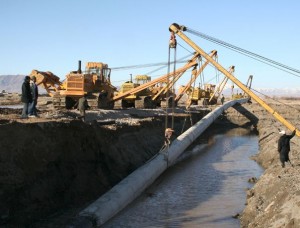 Gas pipeline offers Tehran a way out of isolation enforced by western sanctions, while Islamabad can thumb its nose at US
Gas pipeline offers Tehran a way out of isolation enforced by western sanctions, while Islamabad can thumb its nose at USMahmoud Ahmadinejad�was in jovial mood when he met the Pakistani president,�Asif Ali Zardari, and a 300-strong delegation at the Iranian border town of Chabahar earlier this month.
The�two men were attending a ceremony to launch construction, on the Pakistani side, of a new pipeline�that will funnel natural gas from�Iran's South Pars field in the Gulf to energy-starved Pakistani businesses, car drivers and consumers from the end of 2014.
For the smiling Ahmadinejad, the �5bn pipeline serves several key purposes. It will produce hard currency for Iran's hard-pressed economy. It goes some way to mitigating historical suspicions that have separated Shia Iran and predominantly Sunni Muslim�Pakistan. It boosts Tehran's regional influence.
But more than that, the pipeline will help break the sanctions stranglehold on Iran's energy sector imposed by the US and western allies concerned about Tehran's nuclear-related activities.
"I'm confident that no foreign element will be able to affect our historic and brotherly relations," the Iranian president said. The pipeline was a symbol of the two countries' independence from "those who only aim to humiliate us, and break us apart, and dominate us�... With natural gas, you cannot make atomic bombs. That's why they should have no excuse to oppose this pipeline."
The revival of the much-delayed project, and the timing of the high-profile joint ceremony attended by diplomats from Arab states, appears, in part at least, to be the product of canny calculations by Zardari ahead of Pakistan's national elections on 11 May.
The Pakistani president, whose own five-year term ends in September, wants to be seen to be doing something about chronic energy shortages that bring daily power cuts and caused a nationwide blackout last month.
But by courting Ahmadinejad, Zardari was also sending a pointed signal to the US government. Pakistan's long-running, ambivalent relationship with its principal financial backer and strategic ally has been more hate than love in recent times.
Strong anti-American feeling, outraged by the 2011 commando raid that found and killed Osama bin Laden on Pakistani territory and by lethal Afghan border incidents involving Pakistani and American troops, is being stoked on an almost weekly basis by US drone attacks.�US commentators describe the relationship as "toxic".
In this poisonous context, Zardari's move was seen as a deliberate attempt to emphasise Islamabad's growing freedom of action as the American regional presence declines with next year's withdrawal from Afghanistan.
Anthony Skinner, of the British-based Maplecroft risks consultancy, said: "The Pakistani government wants to show it is willing to take foreign policy decisions that defy the US ... The pipeline not only caters to Pakistan's energy needs but also lodged brownie points with the many critics of the US among the electorate."
Senior Pakistani officials point to a string of decisions by Zardari designed not only to loosen Washington's suffocating embrace but also keep India, Pakistan's major regional rival and sometime foe, at bay. These include his collaboration with David Cameron and Hamid Karzai, the Afghan president, in a trilateral process on Afghanistan's future that has excluded Delhi.�The most recent meeting was held at Chequers last month.
Ignoring US and Indian concerns, Zardari has also held out his hand to China, recently transferring management of the highly strategic port of Gwadar�from a Singapore company to a Chinese one.
"China's presence in the Gwadar port at the mouth of the Arabian Sea will deter India from carrying out any action planned against Pakistan," Chinese state media dutifully noted.
All this, coupled with his success in holding Pakistan's government together, against all the odds, and presiding over what in May will be the first civilian government-to-civilian government democratic transition in the country's history, has boosted Zardari's stock, opening the way for a possible bid for a second term. "For someone who was not trained as a politician, Zardari has seen everybody off," a senior Pakistani official said. "He's got the better of all of them."
The Obama administration, meanwhile, looks on balefully, struggling unsuccessfully to conceal its displeasure and resist the temptation to hit back with sanctions.
Victoria Nuland, the state department�spokeswoman, said: "If this deal is finalised for a proposed Iran-Pakistan pipeline, it would raise serious concerns under our Iran Sanctions Act. We've made that absolutely clear to our Pakistani counterparts."
The US is urging alternative energy solutions on Islamabad, including a notional and, given the security issues involved, rather fanciful plan for a gas pipeline from Turkmenistan to India via Afghanistan and Pakistan.
Washington has also offered help with new hydroelectric dams and other projects. Thestate department's Patrick Ventrell�said: "We really think there are other long-term solutions ... It's in their best interest to avoid any sanctionable activity."
But the senior Pakistani official dismissed such talk as so much hot air. "Hillary Clinton came and offered to help us. But they haven't done anything."
By guardian
The Iran Project is not responsible for the content of quoted articles.










